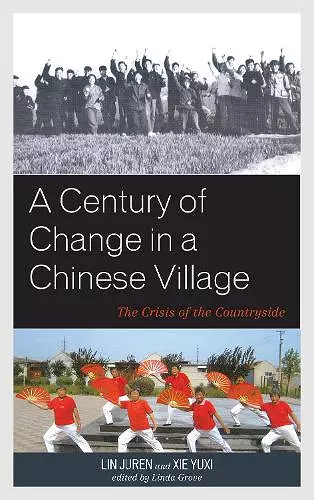A Century of Change in a Chinese Village
The Crisis of the Countryside
Lin Juren author Xie Yuxi author Linda Grove editor
Format:Paperback
Publisher:Rowman & Littlefield
Published:6th May '21
Currently unavailable, and unfortunately no date known when it will be back
This paperback is available in another edition too:
- Hardback£94.00(9781538112359)

Over the last half century, China has evolved from a poor rural country to a geopolitical powerhouse. Rapid urbanization has been at the heart of that transformation, and as migrant laborers have left their villages, what has become of the rural communities that were once the center of economic, social, and cultural life? And how do contemporary Chinese scholars understand those changes? These are the questions that this compelling book answers. Lengshuigou village, located near the Shandong provincial capital of Jinan, was first studied by Japanese social scientists in the early 1940s and then again in the 1980s and 1990s. Building on these rich surveys, this book traces changes from the early twentieth century to the present day in family and lineage, social stratification, personal networks, annual and life cycle rituals, village politics, and elite formation. Drawing on their own large-scale survey of contemporary village households, the authors analyze the physical and institutional changes that have altered the community, as well as the shifts in interpersonal relations and attitudes that have upended centuries-old systems of patriarchy and generational order. This important book presents, for the first time in English, analysis by Chinese sociologists on the radical transformation of Chinese rural society.
A century of change in a Chinese village: The crisis of the countryside, authored by Lin Juren and Xie Yuxi, and translated by Linda Grove, provides a comprehensive and nuanced account of the systematic social, cultural, economic and political changes in a Northern Chinese village called Lengshuigou, located on the fringe of Jinan city, the provincial capital of Shandong. It provides a rich and valuable source of empirical materials and grounded knowledge for scholars interrogating rural China from the disciplinary angles of sociology, anthropology, political science, human geography, regional studies, planning, etc. * Eurasian Geography and Economics *
The present book was published in Chinese in 2013 by a team of sociologists from Shandong University and the Shandong Academy of Social Sciences who benefited from close proximity to and deep familiarity with the village. This translation was ably edited by Linda Grove, who writes a useful, perceptive preface. Because of this long history of research, the book presents a comprehensive overview of a century of rural social change. . . . Although the general story told here will be familiar, the specific characteristics of Lengshuigou will provide food for thought about how contingencies of history and specificities of place give particular shape to general processes of change.
* Pacific Affairs *There is a certain poignancy in the fact that just as this fine book is published, the village that it describes will disappear. In 2018, one of the best-studied villages in China will be razed to make way for a high-speed rail station—a perfect synecdoche for New China erasing the old. Japanese investigators in the 1940s, Japanese and Korean scholars in the 1980s, and teams of Chinese and Japanese academics since the 1990s have carried out exhaustive studies of Lengshuigou, a large village in the North China province of Shandong. All of this work is ably summarized in this rich volume by Lin Juren, Xie Yuzi, and Linda Grove, which charts the changes in politics and society, culture and customs, networks and human relations over four very different eras: ‘traditional’ society, the socialist era of collective agriculture and Maoist class struggle, the early reform years in the 1980s and 1990s, and the twenty-first-century era of accelerating social change. Lengshuigou may disappear, but this memorable record of a vital human community will endure. -- Joseph Esherick, University of California, San Diego
This study of Lengshuigou since the 1930s is essential reading for anyone with an interest in rural China or even social change more generally. It is exceptional not simply for its wealth of detail but for its systematic approach to come to grips with the processes of social change and development from anthropological, political, social, and economic perspectives. One explanation of this success lies in the repeated visits to Lengshuigou by foreign and Chinese researchers and the publication of their results, which provides this volume and its 2010 research with an invaluable resource base. A richly textured account of rural China in transformation, the book details the interactions among wider politics and economics and rural society— both in the past and more recent years— as Lengshuigou inevitably moves from being a rural community to an urban transport hub. -- David S. G. Goodman, Xi’an Jiaotong-Liverpool University, Suzhou
ISBN: 9781538158319
Dimensions: 219mm x 153mm x 19mm
Weight: 508g
318 pages